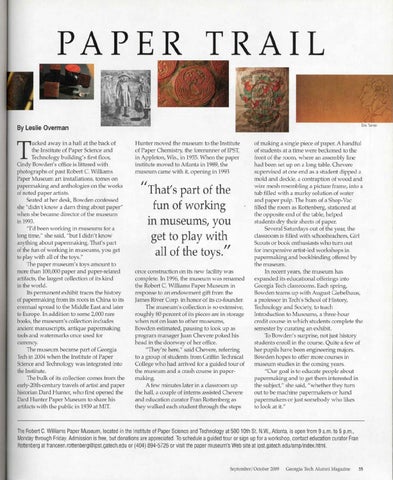PAPER TRAIL Eric Turner
By Leslie Overman
T
ucked away in a hall at the back of the Institute of Paper Science and Technology building's first floor, Cindy Bowden's office is littered with photographs of past Robert C. Williams Paper Museum art installations, tomes on papermaking and anthologies on the works of noted paper artists. Seated at her desk, Bowden confessed she "didn't know a darn thing about paper" when she became director of the museum in 1993. "I'd been working in museums for a long time," she said, "but I didn't know anything about papermaking. That's part of the fun of working in museums, you get to play with all of the toys." The paper museum's toys amount to more than 100,000 paper and paper-related artifacts, the largest collection of its kind in the world. Its permanent exhibit traces the history of papermaking from its roots in China to its eventual spread to the Middle East and later to Europe. In addition to some 2,000 rare books, the museum's collection includes ancient manuscripts, antique papermaking tools and watermarks once used for currency. The museum became part of Georgia Tech in 2004 when the Institute of Paper Science and Technology was integrated into the Institute. The bulk of its collection comes from the early-20th-century travels of artist and paper historian Dard Hunter, who first opened the Dard Hunter Paper Museum to share his artifacts with the public in 1939 at MIT.
Hunter moved the museum to the Institute of Paper Chemistry, the forerunner of IPST, in Appleton, Wis., in 1955. When the paper institute moved to Atlanta in 1989, the museum came with it, opening in 1993
That's part of the fun of working in museums, you get to play with all of the toys/' once construction on its new facility was complete. In 1996, the museum was renamed the Robert C Williams Paper Museum in response to an endowment gift from the James River Corp. in honor of its co-founder. The museum's collection is so extensive, roughly 80 percent of its pieces are in storage when not on loan to other museums, Bowden estimated, pausing to look up as program manager Juan Chevere poked his head in the doorway of her office. "They're here," said Chevere, referring to a group of students from Griffin Technical College who had arrived for a guided tour of the museum and a crash course in papermaking. A few minutes later in a classroom up the hall, a couple of interns assisted Chevere and education curator Fran Rottenberg as they walked each student through the steps
of making a single piece of paper. A handful of students at a time were beckoned to the front of the room, where an assembly line had been set up on a long table. Chevere supervised at one end as a student dipped a mold and deckle, a contraption of wood and wire mesh resembling a picture frame, into a tub filled with a murky solution of water and paper pulp. The hum of a Shop-Vac filled the room as Rottenberg, stationed at the opposite end of the table, helped students dry their sheets of paper. Several Saturdays out of the year, the classroom is filled with schoolteachers, Girl Scouts or book enthusiasts who turn out for inexpensive artist-led workshops in papermaking and bookbinding offered by the museum. In recent years, the museum has expanded its educational offerings into Georgia Tech classrooms. Each spring, Bowden teams up with August Giebelhaus, a professor in Tech's School of History, Technology and Society, to teach Introduction to Museums, a three-hour credit course in which students complete the semester by curating an exhibit. To Bowden's surprise, not just history students enroll in the course. Quite a few of her pupils have been engineering majors. Bowden hopes to offer more courses in museum studies in the coming years. "Our goal is to educate people about papermaking and to get them interested in the subject," she said, "whether they turn out to be machine papermakers or hand papermakers or just somebody who likes to look at it."
The Robert C. Williams Paper Museum, located in the Institute of Paper Science and Technology at 500 10th St. N.W., Atlanta, is open from 9 a.m. to 5 p.m., Monday through Friday. Admission is free, but donations are appreciated. To schedule a guided tour or sign up for a workshop, contact education curator Fran Rottenberg at franceen.rottenberg@ipst.gatech.edu or (404) 894-5726 or visit the paper museum's Web site at ipst.gatech.edu/amp/index.html.
September/October 2009
Georgia Tech Alumni Magazine
55
